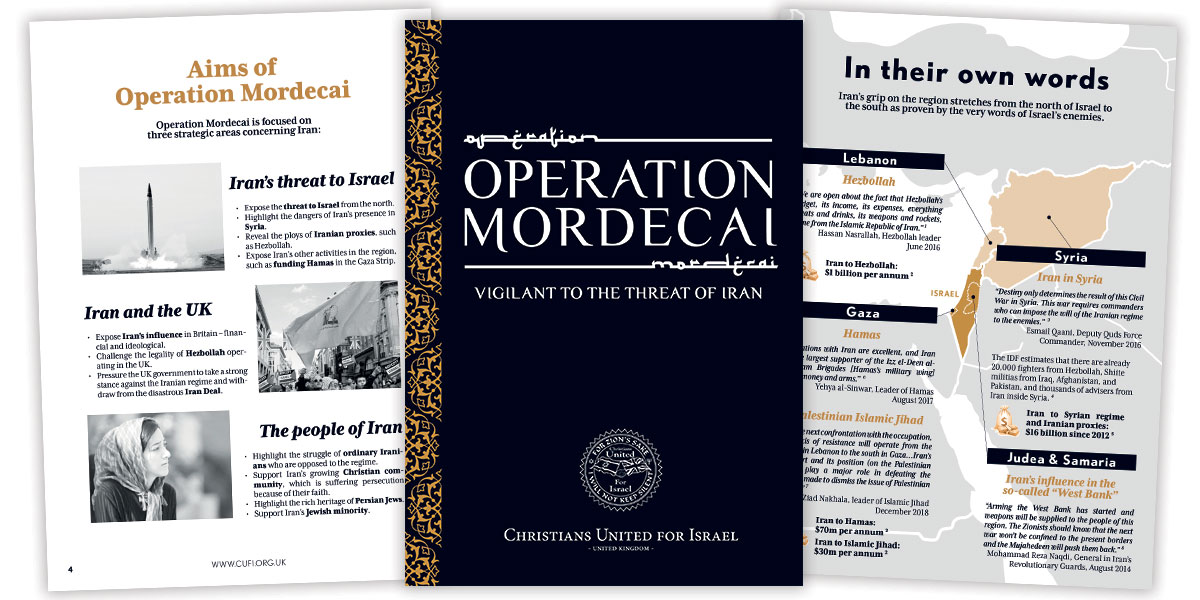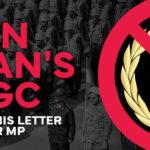Here are 25 reasons why CUFI believes the time has come for Britain to end the deal and take a stronger stand against the Iranian regime.
-
Threatened to kill UK troops
After the US assassinated Iran’s top terrorist general, Qasem Soleimani, in January 2020, a senior commander in Iran’s Quds Force warned that British soldiers could be “collateral damage” in Iran’s attacks on US forces. He also threatened to level Tel Aviv and Haifa.
-
Arrested our UK ambassador, breaking international law
UK Foreign Secretary Dominic Raab described the detention of the UK’s ambassador to Iran as a “flagrant violation of international law”. Ambassador Robert Macaire was accused of supporting anti-regime protests on 11 January 2020, when in fact he was only attending a vigil to pay respects to the victims of the Ukrainian Airlines plane that was shot down, some of whom were British citizens.
-
Unlawfully imprisoned UK citizens
There are currently three British citizens imprisoned in Iran. One of those is Nazanin Zaghari-Ratcliffe, a British-Iranian mother who has been detained in Iran since 3 April 2016. In early September that year she was sentenced to five years’ imprisonment on trumped up charges of “espionage” whilst visiting family with her young daughter.
-
Breached the Iran nuclear deal
In January, Britain, France and Germany finally triggered the dispute resolution mechanism (DRM) in response to Iran’s repeated breaches of the Joint Comprehensive Plan of Action (JCPoA), otherwise known as the Iran Deal. This sends a clear message to the Iranian regime that its multiple breaches of the deal will not be tolerated. Over 12,000 CUFI supporters in the UK have signed a petition calling on the British government to withdraw from the deal. Find out more at www.cufi.org.uk/OperationMordecai
-
Enriched uranium to levels higher than before deal
Iran’s President Hassan Rouhani said in January that the country is now enriching more uranium than it was before the 2015 deal with world powers that was supposed to scale back its nuclear activities, and in particular enrichment. “We are enriching more uranium than before the deal was reached,” Rouhani said. In November 2020, the International Atomic Energy Agency (IAEA) said Iran now has more than 12 times the amount of enriched uranium permitted under the Iran Deal.
-
Lied to the world about shooting down plane
The world didn’t accept that the Ukrainian Airlines plane that crashed shortly after take-off on 8th January was just an accident. After denying any responsibility and refusing to allow an independent investigation, the Iranian regime finally admitted that it “unintentionally” shot the plane down killing all 176 people on board.
-
Bullied civilian oil tankers in the Gulf
Britain’s Royal Navy is now leading the international effort of seven nations to protect shipping through the Strait of Hormuz, the Persian Gulf and the Gulf of Oman. One Royal Navy destroyer faced off against Iranian forces 115 times in a two month period as Iranian forces attempted to illegally seize and intimidate oil tankers and merchant ships travelling in the area. Ships passing through this busy shipping route are now required to travel in convoy with military protection because of the threat of Iran.
-
Illegally captured and held a British oil tanker
In July 2019, Iran captured a UK-flagged tanker, the Stena Impero, in the Strait of Hormuz and held its 23 crew members. The tanker, which Iran falsely accused of violating maritime regulations, was finally released after two months; one month after the release of a Syria-bound Iranian vessel in the Strait of Gibraltar that was in breach of international sanctions.
-
Coordinated terror attacks across Middle East
Iran is the world’s largest state sponsor of international terrorism. General Qassem Soleimani, who was assassinated by the US in January, was responsible for the killing of hundreds of American forces. He was the military commander overseeing the terrorist group Hezbollah, which is responsible for terror attacks across the world, and subscribed to Iran’s tactic of setting up radical Islamist terrorist forces in the Middle East. Soleimani was also behind the brutal crackdown of protests in Lebanon, Iraq and Iran, where thousands of civilians were shot dead by Iranian-backed forces.
-
Funded Hamas, Hezbollah and other terror groups
Terror groups surrounding Israel receive funding directly from the Iranian regime. Last year Iran agreed with Gaza-based Hamas to massively increase its monthly payments to $30 million per month which Hamas mainly uses for terror purposes. Meanwhile the Hezbollah leader, Hassan Nasrallah, has said, “We are open about the fact that Hezbollah’s budget, its income, its expenses, everything it eats and drinks, its weapons and rockets, come from the Islamic Republic of Iran.”
-
Attacked our closest ally, the United States
On 8 January 2020, Iran’s Islamic Revolutionary Guards launched numerous ballistic missiles at two military bases in Iraq used by US troops in response to the killing of Qasem Soleimani. The US embassy in Baghdad has also come under rocket attack by Iranian militia several times during the year.
-
Supported anti-Israel demos in London
The Islamic Human Rights Commission (IHRC), a British charity that openly backs the Iranian regime, is the main organiser of the annual Al-Quds march in London – an event that has seen the burning of the Israel flag, support for Hezbollah and promotion of anti-Semitic slurs. Video from a rally mourning the assassination of Qassem Soleimani in January 2020 shows the IHRC leader Massoud Shadjareh referring to the West as the “enemy” and vowing to “make sure there are many many more Qassem Soleimanis.”
“We aspire to be like him,” Shadjareh said, “We are jealous and we want the same thing for ourselves and our loved ones.”
-
Cyber-attacked Members of Parliament
Iran was behind a massive cyber-attack in 2018 in which British MPs’ personal data, banks, local government branches and the Post Office were targeted.
-
Threatened to wipe out Israel
Iranian political and Islamist religious leaders regularly threaten the demise of Israel. This obsession features in propaganda films and is even inscribed on the casings of Iran’s missiles. In fact, in 2017 a huge digital clock was unveiled in Tehran that is counting down 25 years to the destruction of Israel.
-
Promoted anti-Semitic conspiracies
Anti-Semitic conspiracies are rife in Iran, including Holocaust denial. For example, the Iranian regime sponsors a Holocaust cartoon contents that insults the victims and memory of the Holocaust and diminishes this atrocity. The regime also limits Iranians from hearing about the Holocaust and has sadly hidden the unique role that pre-revolution Iran had in receiving Jewish refugees fleeing Nazi Germany.
-
Spread anti-Israel propaganda
Iran’s problems always seem to be Israel’s fault according to the regime. For example, protests in Tehran over its failing economy have been blamed on Israel. Iranian news media even blamed Israel for causing the deadly earthquake in 2017 saying they probably have a machine. Meanwhile Israel offered Iran aid. The Iranian regime also attempts to stage support for its hatred for Israel in order to mislead the rest of the world. But the anti-Semitic regime does not have full public support. For example, there are plenty of videos leaked on social media that show groups of Iranian students carefully avoiding walking over Israel flags that were painted onto the floor by regime members to serve its propaganda.
-
Developed missiles that can reach Israel and eastern Europe
For the past decade Iran has invested significantly to improve their weapons’ precision and lethality. It possesses the largest and most diverse missile arsenal in the Middle East with the added concern of Iran’s nuclear development programme.
-
Tested ballistic missiles
In 2019, Iran said it had successfully fired a new long-range cruise missile that can reach 1,250 miles. This is in breach of the agreements of the Iran Deal. Whereas Iran’s missile capabilities are quite well known, Iran is also secretly making progress in its ‘space programme’ that could be used as a covert way of developing its capabilities.
-
Set up terror bases in Syria
Iran operates at least 10 terror bases in Syria with some key facilities near the border with Israel. In 2018 it was reported that 20,000 militia fighters loyal to the Syrian regime were trained by Iranian personnel. Iran’s proxy, Hezbollah, also has a foothold in Syria causing further destabilising of the region and a direct threat to Israel.
-
Backed Hezbollah’s foiled bomb plot in London, involving 3 tonnes of explosives
Israel provided Britain with the intelligence to foil Hezbollah’s stockpiling of explosives in North West London in 2015. The ammonium nitrate discovered was more than what was used in the Oklahoma City bombing. Despite the discovery of the plot, it was another four years before Hezbollah was banned outright in the UK and this news was made public.
-
Suppressed freedom of speech
Thousands of Iranians were detained for taking part in nationwide anti-regime protests earlier in 2020. The internet, apps and social media that connect Iranians with the outside world are also heavily restricted and TV broadcasting is tightly controlled and censored. Academic institutions crack down on students having political views and there are harsh penalties if citizens engage in open discussion criticising the regime.
-
Persecuted Christian converts
The church is growing in Iran despite it being one of the most dangerous places to live as a Christian. Christians from Armenian and Assyrian churches are allowed to practise their faith openly, but they still face discrimination, surveillance, and it is illegal for them to share the Christian message with Muslims. However, those that convert from Islam to Christianity must practice their faith secretly due to the death penalty being in force. Open Doors’ 2020 World Watch List reported that at least 169 Christians were arrested in the past year. The relatives of Christians often face public humiliation while their family members await trial and serve long prison sentences. The Iranian regime conducts mass arrests of Christians during the Christmas season to intimidate believers and prevent the spread of Christianity. This year was no exception. Reports indicate that at least nine Christians were arrested on 30 December 2019, on charges of “affiliation with Christian Zionists and recruitment of Muslims to home churches.” Despite Christianity being considered an existential threat to Iran, reports suggest that the number of Christian converts is growing rapidly.
-
Harassed Iranian athletes and celebrities
Navid Afkari, an Iranian wrestling champion. was hanged in Iran in September 2020 for a crime he is unlikely to have committed. He was accused of killing a security guard during the August 2018 protests in Shiraz, which the regime blamed on ‘foreign’ entities – the US and Israel.
Iranian Judo professional, Saeid Mollaei, was forced to flee to Europe in September after Iranian authorities forced him to throw a match to avoid an Israeli rival at judo’s world championship in Tokyo. He reluctantly gave in to Iran’s demands to throw the match after security personnel were sent to his home in Iran, with friends and family messaging him that they had been threatened. In January, Iran’s only female Olympic medallist shocked the country’s regime by defecting. In a strongly worded letter online explaining her decision, the bronze medal winner in Rio 2016 ripped into the regime describing herself as “one of the millions of oppressed women in Iran”. Two Iranian news anchors for the state-owned broadcaster, both quit in protest of the regime in January. The well-known public figures said they could no longer be mouthpieces for the regime with one saying, “forgive me for the 13 years I told you lies.”
-
Abused human rights of its own citizens
Iran’s judicial system is used as a tool to silence critics with the accused being denied legal representation, usually being held indefinitely. Lawyers have also been known to have been imprisoned. In June 2018, authorities arrested prominent human rights lawyer Nasrin Sotoudeh, who had defended several women detained for protesting the compulsory hijab earlier in the year. Women do not receive equal treatment under law and face widespread discrimination and restrictions in movement. For example, consistent with sharia, a woman’s testimony in court is given only half the weight of a man. Certain ethnic minorities and religious groups face discrimination, whilst Iran is second to China in the number of executions it carries out each year.
-
Brutally cracked down on anti-regime protesters
In late 2019, early 2020, hundreds-of-thousands of anti-regime protesters took to the streets having had enough of the failing economy and corruption have been detained by authorities over the past few years. The regime cracked down, using live fire to quell descent. More than 1,500 civilians were killed with thousands more injured or arrested. The constitution states that public demonstrations may be held if they are not “detrimental to the fundamental principles of Islam.” Typically, this means only state-sanctioned demos. Other gatherings are closely monitored and have been subject to brutal dispersing by regime security. Former detainees have reported being beaten during arrest and subjected to torture until they confess to crimes dictated by their interrogators.
-
British MPs among delegates targeted in Iranian bomb plot in Paris
Five British MPs escaped death after an Iranian diplomat attempted to smuggle explosives into a Paris rally in 2018.
The foiled bombing had been planned for the Free Iran Rally on 30 June, 2018, where it was more recently revealed that a 35-strong British delegation were in attendance. There were also believed to be around 100,000 Iranians, and hundreds of international dignitaries, including Donald Trump’s lawyer, Rudy Giuliani. Belgian police then intercepted 550g of explosives in a car in Brussels, and two people were arrested.
British MP Bob Blackman said the plot could have been “the deadliest terror operation ever carried out in Europe”, if the explosion had gone off. He said: “For the first time in history, an accredited diplomat is about to face trial on terrorism charges in Europe. That he represents the government of Iran is no surprise.”
FREE COPY: Understanding the threat from Iran
Covering the threat from Iran to Israel and the West, plus the plight of the Iranian people: Read our Operation Mordecai campaign booklet online or receive a FREE copy by post.












